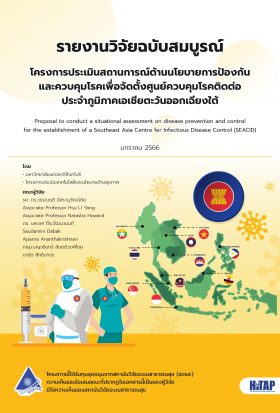This website uses cookies so that we can provide you with the best user experience possible. Cookie information is stored in your browser and performs functions such as recognising you when you return to our website and helping our team to understand which sections of the website you find most interesting and useful.
Research Report: A situational assessment for the establishment of a Southeast Asia Center for Infectious Disease Control (SEACID)

Details
Executive summary
The proposal to conduct a situational assessment on disease prevention and control for the establishment of a Southeast Asia Centre for Infectious Disease Control (SEACID) was an academic study, led by the Saw Swee Hock School of Public Health, National University of Singapore (NUS) and the Health Intervention and Technology Assessment Program (HITAP) . This project was funded by Health Systems Research Institute (HSRI) , Thailand. The project aimed to offer recommendations to operationalise the establishment of a regional centre for disease control in the Association of Southeast Asian Nations (ASEAN) region and beyond.
This initiative was conceptualised as a collaborative research endeavour, drawing on qualitative data such as inputs from scoping review and key informant interviews of regional health experts. The findings showed that there were many factors facilitating the operationalisation of the regional centre for disease prevention and control with the main ones included having strong governance, effective management and participation of stakeholders, as well as creating collaboration from external organisations.
To have an effective regional centre for disease control and prevention, this initiative required mutual understanding of benefit, trust in sharing information, and collective work among member countries. These enablers would support the integration of differences of all country members, promote a sense of coownership, increase workforce capacity through training and knowledge sharing, and facilitate clear communication. A key risk factor to consider for the operationalisation of the centre was the political
sensitivity of each area. This context could cause complications, jeopardising certain activities, such as information sharing and the implementation of public health projects which required working across borders. Therefore, the operationalisation of the centre should focus on supporting and working together with local organisations, rather than directing and intervening by setting the rules for member countries. Capacity building and support for knowledge transfer both within and among countries should be
encouraged as it invigorated the efficiency and capability of the organisation. These actions would help start a cycle, where success would build image and confidence for the organisation, which, in turn, would help attract other donors to invest more in the organisation. Moreover, financial factor was considered very important for the sustainability of the management and operationalisation of the regional centre.




